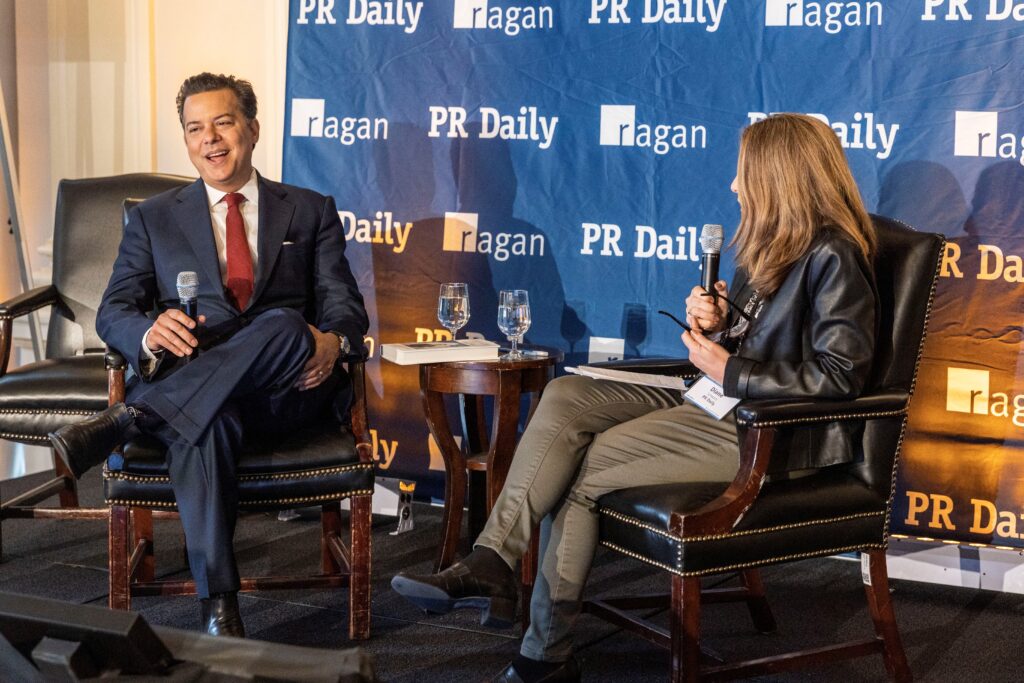Abraham Lincoln’s humor, empathy offer comms lessons for divisive times
CNN anchor John Avlon spoke to Ragan CEO Diane Schwartz about how Abraham Lincoln used storytelling and humor to persuade divided audiences.

There have been about 16,000 books written about Abraham Lincoln and his legacy. Among them, CNN political analyst and anchor John Avlon’s new book, “Lincoln and the Fight for Peace,” may be the first focus on how Lincoln’s skills as a writer, orator and communicator helped shape his plan to move forward after wartime.
During a conversation with Ragan Communications CEO Diane Schwartz at PR Daily’s Media Relations and Measurement Conference on May 11, Avlon explained why no one’s ever done a book about “Lincoln the Peacemaker” before.
“There’s a pretty good reason,” said Avlon, he said, “which is that he’s assassinated five days after Appomattox, after Lee surrenders to Grant. But, as I show, he was developing a very consistent guide to how you win a peace after winning a war. You can’t simply pound your opponents into submission, you can’t salt the fields. You’ve gotta find a way to live together again, to work together again, to reason together again.”
Avlon and Schwartz discussed what today’s communicators can learn from Lincoln’s skills as a storyteller, humorist and empath — and how comms skills can drive reconciliation in today’s bitter social and political climate.
“When you tell stories, particularly about our shared past, it reframes our conversation,” said Avlon. “It elevates the debate. It puts us in a place where we can have a more civil, a more constructive conversation.”
Harnessing the power of humor and empathy through shared stories
During his years as a lawyer, Lincoln traveled the legal circuit and would engage with every day, working class people. During these years, Avlon said, he learned to meet people where they were and became someone with a reputation for speaking in stories. Lincoln understood that communicating your values by talking in parables and sharing your beliefs through stories allowed them to be better received even by those who fundamentally disagreed. He understood how a parable could function as an indirect, nonpreachy way of getting a point across and be delivered with empathy for the recipient’s grievance or predicament.
“He believed in empathizing with your opponents as a means of reasoning with them,” said Avlon, pointing out that several of Lincoln’s stories were even reprinted in the South.
Lincoln also deeply understood that whoever can sway public opinion can change the government. As such, he intentionally used humor in stories to diffuse heated critics rather than attack them for attention. He would talk about how he deployed stories or jokes as a means of getting out of a difficult position or explaining a complex situation.
“In private, he called Jefferson Davis and Robert E. Lee ‘Jeffy D and Bobby Lee,’” Avlon said. “It was a little dismissive, but (also) a gentle reminder that, at the end of the day, the Civil War was a familial fight.”
Understanding humor as a tool of honest communication
Lincoln also understood that his empathy and humor were connected to his deeply held belief in honest communication.
“His honesty was the key to his credibility,” said Avlon. “His nickname ‘Honest Abe’ wasn’t something that was slapped on in the eyes of history—that’s how he was known in his own time. And it gave him credibility when he was negotiating with opponents.”
“Lincoln combined moderation with moral courage,” he continued. “That combination doesn’t happen a lot. “It’s the sweet spot in our politics.”
Because Lincoln was careful to not conflate morality and moderation with a sense of moral superiority, this approach also sets an example for how to communicate with neutrality about topics that contribute to polarization or tribal politics.
Applying Lincoln’s lessons to reduce polarization today
Asked by Schwartz if Lincoln’s communications skills offered any hope for business leaders fighting polarization today, Avlon offered an apocryphal Lincoln quote: “I’m an optimist because I don’t see the point in being anything else.”
“You don’t want to be naïve about the challenges we face,” Avlon said. “No generation gets off without serious challenges and struggles. Disinformation is one of those challenges, and it’s not a new thing. You should see the disinformation around the 1864 election — the attacks on Lincoln were vicious. He was leading a third party advocating for stopping slavery. He’d never held voluntary office. People attacked him all sorts of ways. But he withstood it with a sense of perspective, with a sense of humor.”
Avlon added that navigating misinformation and disinformation amid the rise of new technologies and social platforms “depends on reasoning together.”
“So everyone’s got a role to play,” he continued. “Citizens, in terms of what we consume. Journalists, in terms of confronting it. And businesses specifically — your leadership and your credibility come from being willing to tell the truth and smack down disinformation. To not contribute to distortions of the truth simply because it’s advantageous in the short run. Being an honest broker is what’s gonna get you further in the long run.”







